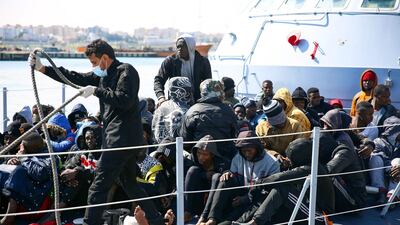At least 15 Africans drowned when their boat capsized off Libya, on Sunday, a UN spokeswoman said.
It was the second shipwreck involving migrants seeking a better life in Europe in just over a week.
Safa Msehli, a spokesman for the International Organisation for Migration, said the 15 were among at least 110 migrants on a boat that set off from the Libyan town of Zawiya on Friday.
The boat started to sink early on Sunday and the Libyan coastguard managed to rescue at least 95 migrants, including six women and two children, Ms Msehli said.
She said many of the survivors suffered from burns from engine fuel, and hypothermia, with some taken to hospital.
“It is an additional tragedy that in most cases there is very little search to recover the bodies," Ms Msehli said.
"The sight of bodies washing ashore later has sadly become too familiar."
Sunday’s shipwreck was the latest along the Central Mediterranean migration route.
At least 41 migrants reportedly died last week, part of a group of about 120 migrants on a dinghy that left Libya on February 18.
The majority of the migrants were from Cameroon, Sudan and Mali, an International Organisation for Migration (IOM) representative said.
The humanitarian group Sea-Watch said its rescue vessel Sea-Watch 3 in the Central Mediterranean had 363 rescued migrants aboard, from five operations starting on Friday.
On Sunday, it carried out three operations, including the rescue of 44 migrants whose wooden boat was about to overturn.
It was seen by aircraft operated by the Moonbird humanitarian group, Sea-Watch tweeted.
The Sea Watch 3 has rescued over 3,000 migrants in distress in the Mediterranean Sea since 2017, the NGO said.
Libya has become the major transit point for African and Arab migrants hoping to reach Europe.
The North African country plunged into a civil war after a Nato-backed uprising toppled and killed long-time ruler Muammar Qaddafi in 2011.
Smugglers often pack desperate families into ill-equipped rubber boats that stall and founder along the Central Mediterranean route.
Over the past several years, hundreds of thousands of migrants have reached Europe on their own or after being rescued at sea.
Thousands have drowned along the way.
Others were intercepted and returned to Libya to be left at the mercy of armed groups or confined in squalid detention centres that lack adequate food and water, rights groups say.



